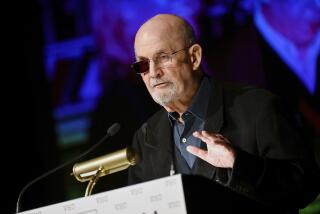High French Officials Give Rushdie Pledge of Support : Mideast: British author, under Iranian death threat over his novel ‘Satanic Verses,’ heartened by declaration.
- Share via
PARIS — Salman Rushdie--the author whom Iran six years ago marked for death for his book “The Satanic Verses”--met France’s highest politicians on Monday, winning assurances that they are willing to lead a European effort to persuade Tehran to declare a “cease-fire” on him.
“I think we are at the beginning of a very serious step,” Rushdie said after meeting with Prime Minister Edouard Balladur, Foreign Minister Alain Juppe and other top French officials.
“This is a situation that can be resolved, but what is needed is the will,” the Indian-born British writer told a well-guarded news conference at the French National Assembly. “And this visit has been an important step in creating the will to remove the deadlock.”
After meeting with Rushdie, Juppe said pressure on Iran had failed so far in the writer’s case. But he declared that France is prepared to bring the issue up again next month at a meeting of European foreign ministers.
“We are ready to take new initiatives in this direction,” he said. He added that “new pressures” might be necessary if Iran refuses to comply, though he declined to say whether those pressures might include sanctions or diplomatic isolation.
Although the language was diplomatic, the French statements were welcomed by Rushdie, who said he is more optimistic than ever before that the death order, issued by the late Ayatollah Ruhollah Khomeini, will be lifted.
Part of the reason for his optimism was a document signed last month by Iran’s ambassador to Denmark. In it, the ambassador promised that his government “never had sent, was not sending and would not in the future send anyone to kill Salman Rushdie.”
Rushdie said he saw other positive signs. For one thing, the fatwa, or religious order condemning him to death for what Iranian clerics said was the blasphemy he committed against Islam with his characters in “The Satanic Verses,” was, for the first time, not formally renewed this year.
He said he hopes that all of Europe’s countries, especially those, like France, with embassies in Iran, will win similar promises from the Tehran government. “If Iran agrees to make a solemn declaration, then we might be able to speak of a cease-fire,” Rushdie said. “Then, we would institute a moratorium for an extended period of time and break this deadlock.”
Rushdie said that if, however, Iran doesn’t agree to make such a statement, he had won assurances from the French that political and economic sanctions against Tehran will be discussed by European leaders. “It’s very important that France do this because this country has influence over Iran and would be taken very seriously,” he added.
Balladur told Rushdie that France opposes the death order. But the premier made no firm promise of support, citing France’s economic interests. “We French want respect for human rights in all countries of the world,” Balladur said in a television interview. “But at the same time we have an economic position to defend in the world.”
Balladur added that he thought it was possible “to find a good balance. Something we cannot tolerate is threats to people and abuses of human rights.”
And in a jab at retiring President Francois Mitterrand, who welcomed Cuban leader Fidel Castro last week with open arms, Balladur said France has to be consistent. “We cannot tolerate (human rights abuses) more in Cuba than we would in Iran.”
The apparent mixed signals from Balladur and Juppe came as no surprise in France, where foreign policy has been muddled by the presidential aspirations of Balladur and of Juppe’s candidate, Paris Mayor Jacques Chirac. How much pressure is eventually applied on Iran may depend on who wins the elections, two rounds of which are set for April 23 and May 7.
Rushdie remains under heavy police protection these days, though he has increased his public appearances since 1992. Fears he might attract terrorist attacks have made it difficult for him to buy airline tickets. Wearing dark glasses and a baseball cap, he entered France from London over the weekend by train, via the Channel tunnel.
“I’ve spent six years talking about human rights, free expression and the fight against terrorism,” he said. “Until now there have been great words. But today is a concrete day for concrete acts.”
More to Read
Sign up for Essential California
The most important California stories and recommendations in your inbox every morning.
You may occasionally receive promotional content from the Los Angeles Times.














